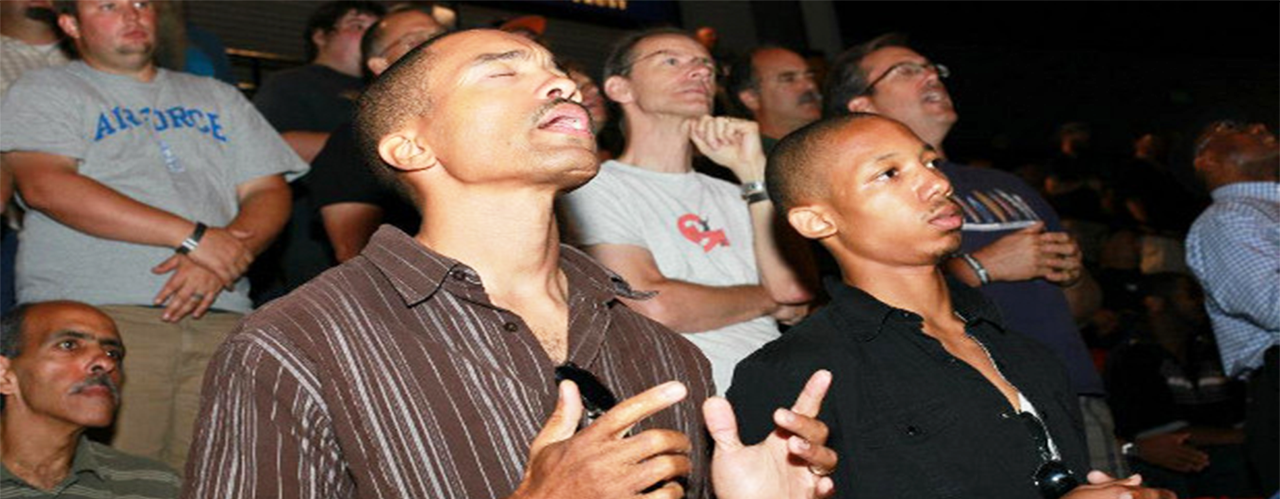A congregation praying during a Christian conference.
by Jennifer Kennedy Dean, author, speaker, conference leader and executive director of the Praying Life Foundation. You can visit her online at prayinglife.org.
I grew up in a praying family. From earliest childhood, I was encouraged to commit everything to God through prayer. Nothing was either too important or too insignificant to leave in God's hands.
My parents did not teach me about prayer with their words, but with their lives. They had more than "a prayer time"—a section of their days set aside for praying. Instead, prayer permeated and controlled every aspect of their lives.
Prayer, I later came to realize, can be an activity or it can be a life. You can think of it in terms of "my prayer life," as you would say "my home life," or "my work life"—as if prayer were one compartment among many. But I knew that prayer as a task or an activity would not meet the deep yearning I had to know God.
It was not a prayer life I wanted, but a praying life—a life of ongoing and continual interaction with God. Andrew Murray has said, "Answered prayer is the interchange of love between the Father and His child." I want an uninterrupted flow of love between the Father and me. Isn't that what you want? Isn't your heart crying out for that?
You see, there is an undercurrent of prayer always active in a believer's life. The Spirit of Christ is within you crying out, "Abba, Father" (Gal. 4: 6). To put it in today's language, He is calling out, "Daddy! Daddy!" The Spirit is always praying the Father's will, and the Spirit is housed in you (Rom. 8: 9, 11, 15, 26-27; 1 Cor. 6: 19).
At some level, in every believer, prayer is always happening. The praying life is Christ. It is the life of Jesus Christ operating in you.
The key to learning to live a praying life is this: Learn how, more and more often, to tap into the undercurrent of prayer, the active presence of Jesus in you. Join your voice with His in harmonious prayer. When I became a young adult, I realized that a praying life was not built on information communicated from one person to another, but on a life-absorbing relationship with God.
I sensed the difference between a prayer life and a praying life, and I knew which one I craved. I knew that there was only one who could teach me to pray—who could be my prayer teacher. To Him I brought my inadequacy and my hungry heart.
"Lord," I cried, "I know how to say prayers, but I don't know how to pray. Teach me to pray!" In response to my heart's cry to teach me deep truths about prayer, God began to open His Word to me in new ways.
Familiar passages took on fresh meaning. Dull, dry passages pulsed with new life. I felt myself being "taught by the Lord" (Is. 54: 13).
To this day, some 40 years since I embarked on this soul-quest, it is still new. Each time I discover a concept, He brings me opportunities to put it to the test. The words of the Scriptures shape my life and define my experiences. Slowly but surely, He is building my life into a praying life.
As I submitted myself to God for instruction in prayer, He seemed to ask me, "Jennifer, why do you want to learn to pray?" I knew all the "right" answers, but they had a hollow, false ring to them.
My experience must have been similar to Peter's. How surprised he was when Jesus did not accept his glib answer to the question, "Peter, do you love Me?" Each time Jesus asked, Peter must have been forced to look deeper inside his heart for the true answer. That is always God's starting place—your truth. No matter how ugly your truth is, He can work from it. What He can't work from is pretense.
As He had with Peter, God peeled back the layers of my practiced, memorized answers that I got from other people until my truth emerged. And my truth was not pretty. "Father, I want to know how to pray so that I will know how to get You to do what I want You to do when I want You to do it. I hope to learn how to make the best possible use of prayer for my benefit."
Once I reached that point of honesty, I knew my course was set. God could work with me now because He could begin with my weakness. At the point of my weakness, His strength would be put on display.
My prayer teacher could begin by teaching me a new purpose for prayer. This book tells of my journey so far. But the journey never ends. Every single day I learn something new about prayer, or I learn something in a deeper way. It is my hope that when others read what I have learned and the inner changes that have occurred, they will be inspired to sit at the Master's feet.







